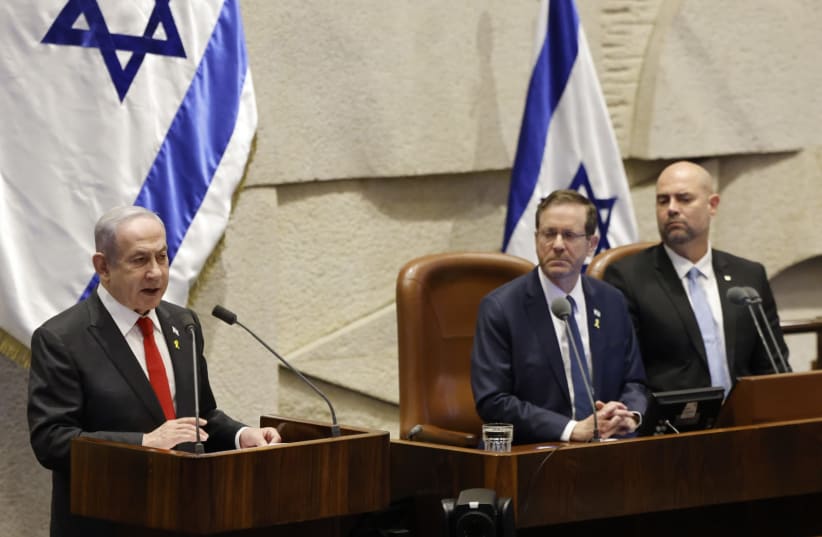Israel's parliament, the Knesset, marked its 75th birthday in a somber ceremony on the plenum floor on Wednesday morning, with President Isaac Herzog, Prime Minister Benjamin Netanyahu, Opposition Leader MK Yair Lapid, interim Supreme Court Chief Justice Uzi Fogelman, and dozens of foreign ambassadors and other dignitaries.
Every year on the spring holiday of Tu Bshvat, which falls on Thursday, the Knesset traditionally holds a large event open to the public, with festivities to celebrate both the holiday and the Knesset's founding in 1949. However, this time, the ceremony began with a moment of silence in memory of the 24 soldiers who were killed in two incidents in the Gaza Strip on Monday.
Knesset Speaker MK Amir Ohana in his speech stressed the diverse backgrounds of the soldiers who were killed, including Elkana Vizel, who was evacuated from Gush Katif in the Gaza Strip; Nir Binyamin, from Givatayim; and Ahmad Abu-Latif, from the Bedouin city Rahat.
"The people of Israel are not strangers to riots, persecution, slaughter and Holocaust," Ohana said. "But always, out of the deep pain, out of the grief and bereavement, out of the deep sorrow and sadness, we always knew how to grow and bud, build and be built, learn and teach, blossom and plant, live, and bring life to the world. This is what will happen this time as well."
Herzog called on the members of the Knesset to internalize the fact that unity amongst the people begins with unity in the Knesset itself – and that despite all of the differences and arguments, Israel cannot afford to allow itself to return to the animosity that existed before October 7.
"No one doubts that this House will hold very soon the most important and probably the most stormy discussions - on security, economy and society, on war and peace, about the day before and the day after, on political and public policies and processes, on drawing conclusions and learning lessons, and also about our normalization processes in the Middle East, which Hamas, Hezbollah, the Houthis, and the head of the evil terrorism - Iran - are trying to thwart with all their might," Herzog said.
"In these discussions, the coalition has an important place, and an equally important place is held by the opposition," the president continued. "But, when we stand in historical moments, facing challenges, of the like few nations face, I feel obliged to express here that which we hear from the hearts of the people: There is a way to argue. Even when arguing, be worthy. We cannot allow a return to the discourse of October 6. We cannot talk about a change in the public discourse, without this House itself making a change in the discourse. We cannot talk about mutual respect and unity - without the Knesset taking a central part in the change," Herzog said.
Netanyahu in his speech reiterated his commitment to defeating Hamas. The prime minister referred to a claim that October 7 marked a return to the beginning of Zionism – the pogroms in eastern Europe and the understanding that Jews must have the ability to defend themselves. The current war was indeed a test for the Jewish people about their determination to remain a sovereign people in their land – and Israel must, and will, be victorious in all its aims – to topple Hamas, release the hostages, and ensure that there will never be a military threat from Gaza.
Yair Lapid to Knesset: What is there to celebrate?
Lapid, who has ramped up his criticism of the government and begun to call in recent weeks for an election, struck a different tone.
"We gathered here to celebrate the Knesset's birthday. What is there to celebrate? Do you see anyone else in the country celebrating?" Lapid said. He argued that "the Knesset and government are not the solution, they are the problem," adding that "the time has come for us to ask ourselves how we arrived at a situation in which the citizens of Israel, the best people in the world, feel like they have lost control over their lives, and no one is caring for them."
Lapid offered thinly veiled criticism, saying that the government must say loud and clear that the utmost goal is to bring the hostages back home – and then begin to deal not just with tactics, but with strategy.
"Gaza is just part of the problem … Israel will win the war, but victory is not just killing (Hamas military leader Yahya) Sinwar. Victory is being better – better to each other, and better as a nation. For the living and those who are being buried, we must bring about change," Lapid said.
"We know today that the fact that we did not make this change on time led to a disaster. The biggest disaster in our history. We will not let the next disaster happen. Israel will carry out the necessary change, there is no other way," Lapid concluded.

